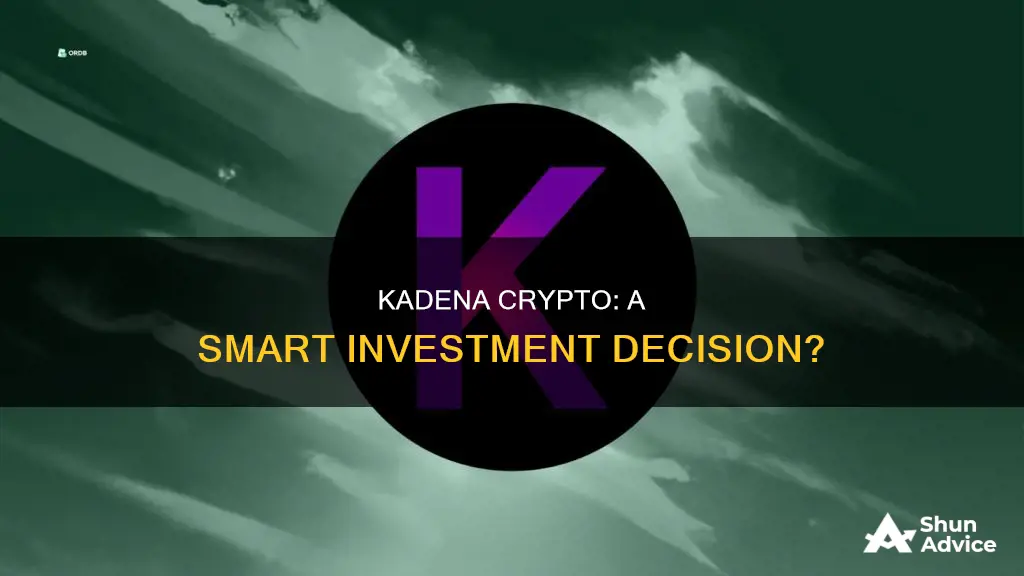
Kadena (KDA) is a smart contract platform that enables developers to build quality projects. It is one of the most active cryptocurrencies and has been attracting the attention of developers due to its real-world applications and ability to solve some of the challenges associated with the Ethereum blockchain, such as security, gas fees, scalability, congestion, and efficiency. With its co-founders' backgrounds in JPMorgan and the Security and Exchange Commission, Kadena has a lot of potential in the crypto space. However, it is still relatively new and faces strong competition from other blockchains. So, is Kadena crypto a good investment?
What You'll Learn

Kadena's pact smart contract
Kadena is a smart contract platform that enables developers to build quality projects. The Kadena smart contract, known as Pact, is described as a "human-readable Turing-incomplete smart contract language purpose-built for blockchains with powerful security features."
Pact is an open-source programming language designed specifically for writing smart contracts and developing blockchain applications. It is similar to general-purpose, Turing-complete languages in its syntax, function declarations, and imperative style. However, one of its key features is that it is Turing-incomplete, meaning it does not allow infinite loops or recursion. This makes Pact contracts safer and less vulnerable to attacks and exploits.
Pact code is stored in a human-readable form directly on the blockchain, allowing anyone to review the code and be sure of what it is doing. This transparency is critical for accessibility and encourages shorter, easier-to-understand programs. Pact also supports formal verification, using Z3, an open-source tool developed by Microsoft, to mathematically verify and test for bugs in the code.
Pact smart contracts consist of a module that defines the logic of the contract, keysets that specify who has access and can make updates, and tables that store data generated by Pact modules. These components support a wide range of functionality, providing developers with the tools needed to create robust solutions for real-world problems.
The benefits of Pact include its relatively lower cost and fast speeds. For example, while Solana can handle about 2,000 transactions per second, Kadena can process about 480,000. This makes Kadena one of the best platforms for smart contracts today, despite being a relatively new entrant facing strong competition.
The Best Crypto Coin to Invest in Now
You may want to see also

Ethereum's limitations
Ethereum is a distributed blockchain platform that enables programmers to create any computable function. However, it has some limitations and challenges.
Firstly, it is one of the slowest smart contract platforms available today, processing fewer than 20 transactions per second. This slowness is a significant drawback for users who expect near-instant results.
Secondly, Ethereum is relatively expensive to use. Every action on the platform incurs a cost, and as the network becomes busier, these costs can increase. This expense can deter users and make certain applications impractical.
Thirdly, Ethereum lacks privacy. All transactions are public, and it is difficult to keep secrets or ensure privacy. This limitation can be problematic for users who require confidentiality or wish to protect sensitive information.
Additionally, Ethereum does not easily interface with the "real world". Even simple actions that rely on something off-chain require complicated mechanisms. This complexity can hinder adoption and integration with existing systems.
Moreover, Ethereum struggles with scalability and centralisation. The network currently handles around 5 transactions per second, far below the capacity needed to function as the backbone of the internet of value. This limitation raises concerns about its ability to scale effectively.
Lastly, Ethereum's smart contracts have certain restrictions. For example, they cannot be initiated after a certain time or at certain intervals without external impact or a third-party service. This restriction limits the platform's flexibility and automation capabilities.
While Ethereum has its limitations, it is important to recognise that it is a pioneering technology with a vast potential that developers are continuously working to improve.
Investing $4000 in Bitcoin: What Returns to Expect?
You may want to see also

Kadena's bullish price predictions
Kadena (KDA) is a blockchain that uses the security of Bitcoin, virtually free gas, and safer smart contracts to ensure efficiency, scalability, and high security of its network. It is one of the most active cryptocurrencies that took the crypto space by storm in 2021.
Kadena's price has been rebounding in the past few days. The KDA token jumped to $20, which is about 28% above the lowest level this week. It is slightly below the all-time high of $28.60, bringing its total market cap to more than $3 billion.
Kadena is a smart contract platform that enables developers to build quality projects. The main reason why developers are turning to it is the relatively lower cost and blazingly fast speeds. For example, while Solana can handle about 2,000 transactions per second, Kadena can process about 480,000.
Kadena's bullish market price prediction for 2022 is $26.41, and it is expected to reach $30 by the end of the year. The bullish KDA price prediction for 2023 is $50, and for 2024, it is expected to reach $100. By 2025, Kadena's price is predicted to reach $150, and by 2026, it is expected to hit $400.
Kadena has a bright future ahead of it in 2022 and beyond. With ongoing developments happening within the Kadena blockchain and the overall crypto market, we may see KDA reach new heights, breaking the present all-time high price of $28.25 that was attained on November 11, 2021.
A Beginner's Guide to Investing in Bitcoin
You may want to see also

Kadena's co-founders
Kadena is a blockchain platform that provides services in DeFi, NFT, payments, interop, and relays. It is the only blockchain scalable enough to fully replace the global financial system and other legacy centralized systems without compromising on speed or security.
Kadena was founded by Stuart Popejoy and William Martino. Before founding Kadena, Stuart Popejoy led JPMorgan's Emerging Blockchain group. William Martino was recruited from his role as the Tech Lead for the SEC's Cryptocurrency Steering Committee. Together, they built JPMorgan's first blockchain, now known as JPM Coin. They left JPMorgan in 2016 to launch Kadena and begin work on what would become Chainweb and Pact.
Stuart Popejoy is the current CEO and Founder of Kadena. He previously worked at JPMorgan and led the Emerging Blockchain group. William Martino, on the other hand, served as the Tech Lead for the SEC's Cryptocurrency Steering Committee.
Kadena has since caught the attention of Dr. Stuart Haber, one of blockchain's co-inventors. Impressed with Kadena's technology and philosophy, Dr. Haber officially joined Kadena as an advisor in 2018 and continues to work with the company.
Bitcoin vs Stocks: Why Bitcoin is a Superior Investment
You may want to see also

Kadena's blockchain technicalities
Kadena is a proof-of-work blockchain that combines the PoW consensus mechanism from Bitcoin with directed acyclic graph (DAG) principles to offer a scalable version of Bitcoin. It is the only blockchain that claims to be capable of powering global finance, providing the security, scale, and throughput needed to support global finance.
Kadena achieves this by braiding chains together, offering not one but several (initially 10, now 20, and with the potential to be 50 or 100 or more in the future) separate blockchains that all work simultaneously and asynchronously to validate transactions. This is known as Chainweb, a chain architecture that combines several proof-of-work blockchains. Each chain confirms its three peer chains' blocks, thereby increasing throughput and security. An attacker would have to fork not just one chain but all the running chains to attack just one.
Kadena's smart contract language is called Pact, a human-readable and Turing-incomplete language specifically built for blockchains with powerful security features. It is described as a “human-readable Turing-incomplete smart contract language purpose-built for blockchains with powerful security features”.
Kadena also offers crypto gas stations, which allow businesses to pay for their customers' gas fees, removing a massive pain point in adopting blockchains for business.
Cryptocurrency Investment: High Risk, High Reward Potential
You may want to see also
Frequently asked questions
Kadena's value is expected to continue to expand as shortage tends to encourage price rise. However, there is some risk to any investment. It is not recommended as a good investment for the next year by Wallet Investor.
The future of Kadena is highly dependent on the overall performance of the crypto industry. When investing in KDA, one must ensure that they are using the right strategy as it is not suited for those with an asymmetric risk profile.
In terms of price, Kadena has an outstanding potential to reach new heights. According to specific experts and business analysts, Kadena can hit a maximum price of $5.81 by 2030.







